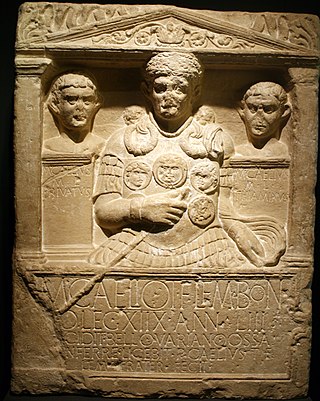
The Battle of the Teutoburg Forest, also called the Varus Disaster or Varian Disaster by Roman historians, was a major battle between Germanic tribes and the Roman Empire that took place somewhere near modern Kalkriese from September 8–11, 9 AD, when an alliance of Germanic peoples ambushed three Roman legions led by Publius Quinctilius Varus and their auxiliaries. The alliance was led by Arminius, a Germanic chieftain and officer of Varus's auxilia. Arminius had received Roman citizenship and a Roman military education; thus allowing him to deceive the Romans methodically and anticipate their tactical responses.

Arminius was a chieftain of the Germanic Cherusci tribe who is best known for commanding an alliance of Germanic tribes at the Battle of the Teutoburg Forest in AD 9, in which three Roman legions under the command of general and governor Publius Quinctilius Varus were destroyed. His victory at Teutoburg Forest precipitated the Roman Empire's permanent strategic withdrawal and the decolonisation of Germania Magna, and modern historians regard it as one of Imperial Rome's greatest defeats. As it prevented the Romanization of Germanic peoples east of the Rhine, it has also been considered one of the most decisive battles in history and a turning point in human history.

Sword-and-sandal, also known as peplum, is a subgenre of largely Italian-made historical, mythological, or biblical epics mostly set in the Greco-Roman antiquity or the Middle Ages. These films attempted to emulate the big-budget Hollywood historical epics of the time, such as Samson and Delilah (1949), Quo Vadis (1951), The Robe (1953), The Ten Commandments (1956), Ben-Hur (1959), Spartacus (1960), and Cleopatra (1963). These films dominated the Italian film industry from 1958 to 1965, eventually being replaced in 1965 by spaghetti Western and Eurospy films.
Segestes was a nobleman of the Germanic tribe of the Cherusci involved in the events surrounding the Roman attempts to conquer northern Germany during the reign of Augustus and then Tiberius.

Gordon Mitchell was an American actor and bodybuilder who made about 200 B movies.

The history of the Calvinist–Arminian debate begins in the early 17th century in the Netherlands with a Christian theological dispute between the followers of John Calvin and Jacobus Arminius, and continues today among some Protestants, particularly evangelicals. The debate centers around soteriology, the study of salvation, and includes disputes about total depravity, predestination, and atonement. While the debate was given its Calvinist–Arminian form in the 17th century, issues central to the debate have been discussed in Christianity in some form since Augustine of Hippo's disputes with the Pelagians in the 5th century.
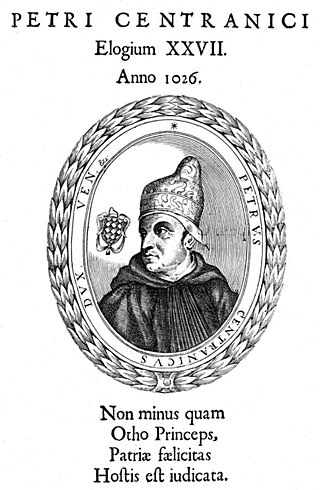
Pietro Barbolano was the 28th Doge of Venice. Reportedly a descendant of the legendary Eraclea, he was elected by the assembly of the nobles after the deposition of his predecessor, Otto Orseolo. The dates of his birth and death are unknown.
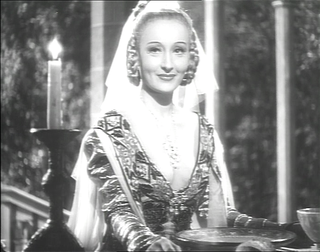
Clara Calamai was an Italian actress.
Bartolomeo Trinci was the lord of Foligno from 1415. He succeeded his father Ugolino III Trinci, jointly with his brothers Niccolò and Corrado.
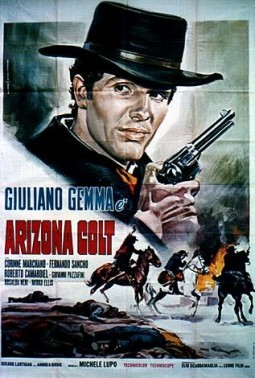
Arizona Colt, also known as The Man from Nowhere, is a 1966 technicolor spaghetti Western directed by Michele Lupo and starring Giuliano Gemma, Fernando Sancho, Corinne Marchand.

Silvana Jachino was an Italian film actress. She appeared in 65 films between 1936 and 1970.
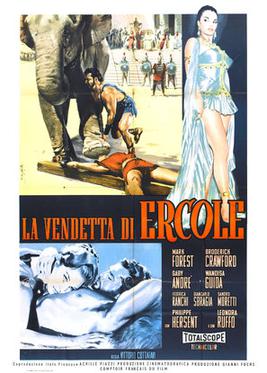
Goliath and the Dragon is a 1960 sword-and-sandal film directed by Vittorio Cottafavi and starring Mark Forest and Broderick Crawford.

Roger Browne Jr. was an American actor and voice artist, best known for his work in Italian cinema. He was a star of peplum and Eurospy films popular in Europe during the 1960s and 1970s.

Roberto Risso was a Swiss-born Italian film actor.

Gianpaolo Rosmino was an Italian actor and film director. Rosmino enjoyed a lengthy screen career. After making his debut in the silent era in 1913 he appeared in more than 80 films and television series up to 1965. He played a prominent role in the 1913 silent Love Everlasting, one of the two most famous Italian early silent films. He is sometimes credited as Gian Paolo Rosmino.

Gomorrah is an Italian crime drama television series created by Roberto Saviano for Sky Atlantic. Based on Saviano's book of the same name, the show premiered on Sky Atlantic in Italy on 6 May 2014. The series ran for five seasons totaling 58 episodes until 17 December 2021. The 2008 film of the same name is loosely based on the same book, but unrelated to the TV series.

1992 is an Italian political drama television series created by Alessandro Fabbri, Ludovica Rampoldi, Stefano Sardo for Sky Atlantic and La7, and based on an idea by Stefano Accorsi. It premiered on 24 March 2015 on pay-tv Sky Italia channels Sky Atlantic and Sky Cinema 1.

Julius Caesar Against the Pirates is a 1962 Italian adventure film written and directed by Sergio Grieco and starring Gustavo Rojo, Abbe Lane and Gordon Mitchell. It is loosely based on actual events from the early life of Julius Caesar.
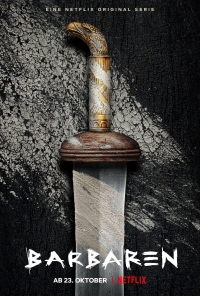
Barbarians is a 2020 German historical war drama television series created by Andreas Heckmann, Arne Nolting, and Jan Martin Scharf. It stars Laurence Rupp, Jeanne Goursaud, and David Schütter. The series is a fictionalized account of events during the Roman Empire's occupation of Germania, and the subsequent rebellion of some Germanic tribes led by Arminius. The series was renewed for season 2 on 10 November 2020. It was released on Netflix on 21 October 2022.

















